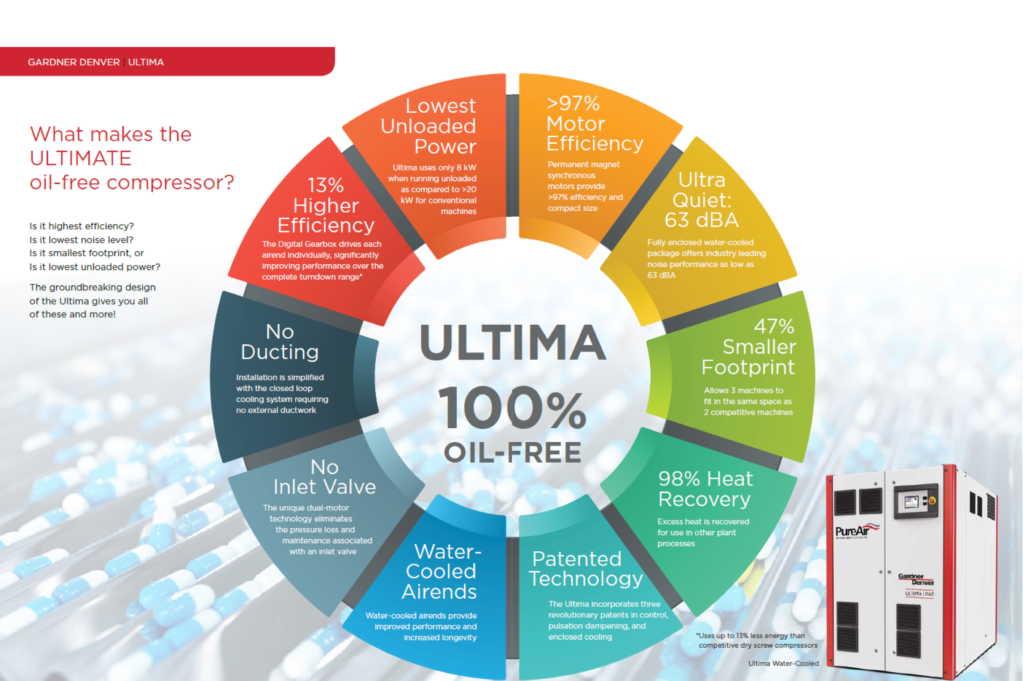5 Misconceptions About Oil-Free Air Compressors
Oil-free air compressors are growing in popularity. In industries such as pharmaceutical, food, medical device, and electronics manufacturing, they have become a staple. Other industries employ them in an effort to avoid oil vapors that can damage sensitive production equipment or because oil-free compressors are reputed to reduce maintenance needs. While they do offer the advantage of oil-free operation, which is crucial in industries where high-quality air is a requirement, there are some common misconceptions surrounding oil-free air compression technology. It’s time to clear the air and debunk these myths so that users of oil-free air compressors can be certain they are getting the highest quality air from their oil-free models.

What is an Oil-Free Air Compressor?
Oil-free air compressors do not use oil within the compression chamber. Some oil-free air compressors use water or Teflon to protect components while allowing them to move smoothly without the use of oil-based lubricants. Other oil-free compressor designs eliminate metal-to-metal contact within the compression chamber, so lubrication is not necessary. In some oil-free models, the bearings and gears within the gearbox will still require lubrication; however, this is external to the compression chamber and proper sealing of the gearbox prevents oil from contaminating the delivered compressed air.
Oil-free air compressors are often employed in industries such as food and pharmaceutical processing where product contamination is not permissible, so compressed air purity is a priority. Other manufacturers insist on oil-free air compressors because sensitive production equipment must remain free of contamination to avoid expensive downtime. Still other facilities install oil-free compressors because they believe oil-free compressors offer improved compressed air quality and reduced maintenance needs.
While these are all valid reasons to embrace oil-free air compression technologies, there are some common misconceptions that need to be addressed so that current and prospective users of oil-free air compressors are better educated about oil-free technologies.
5 Common Misconceptions About Oil-Free Air
| Misconception #1: Oil-Free Air Compressors Do Not Use Oil As mentioned above, oil-free air compressors do not use oil within the compression chamber, which means that oil does not contact the air being compressed so clean, oil-free air is generated by the compressor. However, oil may be needed for lubricating moving parts within the gearbox and to cool the compressor itself. Oil-free air compressors use sealing systems to prevent these oils from reaching the compressed air chamber so these critical seals must be closely monitored to ensure that they have not failed, as failure could introduce oil into the compressed air system. |
| Misconception # 2: Oil-Free Air Compressors Produce Contaminant-Free Air While it is true that oil-free air compressors should provide oil-free compressed air, thus reducing the amount of oil that needs to be removed from the produced compressed air, contaminants and oils from other sources can still enter the compressed air stream. A variety of contaminants, such as water vapor; oil vapor (from industrial processes or car exhaust), dirt, microorganisms and other contaminants from the atmospheric air; rust and scale from within the air compression system; and other contaminants can still be drawn into the compressed air system. For this reason, oil-free air compressors do not guarantee that produced air will be entirely free of oil or other contaminants, so filtration and purification are still needed. |
| Misconception # 3: Oil-Free Air Compressors Do Not Require Air Treatment Components A common misconception is that purification equipment is not needed when using an oil-free air compressor; however, as mentioned above, there are many contaminants that oil-free air compressors cannot control. For this reason, downstream particulate and oil filters should not be eliminated from an oil-free air compression system. Installation of appropriately rated downstream filters will help ensure that the supply of compressed air meets the necessary quality and purification level for the process or industry. |
| Misconception # 4: All Oil-Free Compressors Provide Class 0 Compressed Air According to ISO8573-1, there are different levels or classifications of oil-free compressed air, with Class 0 being the purest air and the one that must meet the most stringent quality requirements. Not all oil-free air compressors provide Class 0 compressed air, so if this is a requirement, be sure to select a Class 0-certified oil-free air compressor. And, keep in mind that the ISO standard does not only include oil as a potential contaminant. ISO8573-1 has classifications for particulate, water and oil, so the compressor’s specifications should specify the contaminant to which the Class 0 rating refers. |
| Misconception # 5: Oil-Free Air Compressors Have a Lower Cost of Ownership It’s a common misconception that oil-free technologies eliminate the need for filters, so it is often expected that costs associated with purchasing and changing filters, as well as costs associated with filter-related pressure drops and energy usage are eliminated. But, as mentioned previously, downstream filtration is still a necessity, thus negating this claim. However, because there is no need to continually refill the compression chamber with oil for lubrication, these maintenance costs and expenses associated with oil leaks and oil disposal will likely be reduced when using an oil-free air compressor. Although models with gearboxes and those using lubricants for cooling will still incur some expenses. However, because oil-free air compressors have a higher initial cost than traditional air compressors and typically run hotter, which means internal components tend to burn out faster and require maintenance earlier in the life cycle, any savings related to oil maintenance will be negligible. That said, in sensitive processes that need to meet oil-free standards for compressed air, the risk of contaminated compressed air from traditional or “technically oil-free” air compression technologies is generally a greater concern than the cost of ownership, making it a worthwhile investment. |
Hopefully this blog has cleared up some common misconceptions regarding oil-free air compressors so that users of the technology better understand the capabilities. For more information about whether an oil-free air compressor is right for your process, please contact JHFOSTER.
